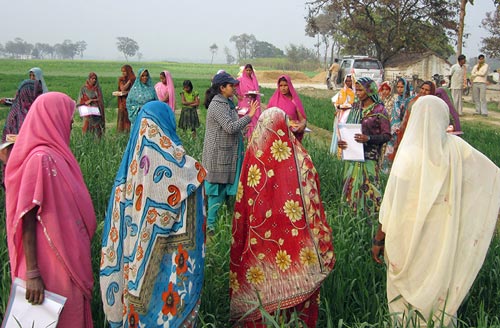 In the continuous effort to increase awareness of wheat biofortification and its use to improve health and quality of life in eastern India, Banaras Hindu University (BHU), Mahamana Krishak Samiti farmers’ cooperative, CIMMYT, and HarvestPlus, with support from M/s Shyam Seed Company, organized a series of farmer-scientist interactions and field visits on 5, 15, 20, 24, and 28 February 2013 in about 20 villages in the Mirzapur and Chandouli districts, Uttar Pradesh. The series focused on training and advocacy among women groups, monitoring and data recording in participatory variety selection trials, monitoring of seed multiplication undertaken by M/s Shyam Seed Company, problem resolution by farmers, seed multiplication strategies, pre-release of mini-kit trials, and varietal release. Over 70 farmers interested in HarvestPlus experiments participated at each location. “They were optimistic about zinc-enriched wheat varieties and keen to know when these varieties would be available for cultivation,” said CIMMYT wheat breeder Arun Joshi.
In the continuous effort to increase awareness of wheat biofortification and its use to improve health and quality of life in eastern India, Banaras Hindu University (BHU), Mahamana Krishak Samiti farmers’ cooperative, CIMMYT, and HarvestPlus, with support from M/s Shyam Seed Company, organized a series of farmer-scientist interactions and field visits on 5, 15, 20, 24, and 28 February 2013 in about 20 villages in the Mirzapur and Chandouli districts, Uttar Pradesh. The series focused on training and advocacy among women groups, monitoring and data recording in participatory variety selection trials, monitoring of seed multiplication undertaken by M/s Shyam Seed Company, problem resolution by farmers, seed multiplication strategies, pre-release of mini-kit trials, and varietal release. Over 70 farmers interested in HarvestPlus experiments participated at each location. “They were optimistic about zinc-enriched wheat varieties and keen to know when these varieties would be available for cultivation,” said CIMMYT wheat breeder Arun Joshi.
Prior to each event, the BHU/HarvestPlus team (Balasubramaniam Arun, Ramesh Chand, and Vinod Kumar Mishra) introduced the project’s objectives and the importance of biofortified wheat varieties. Chandra Prakash Srivastava and Girish Chandra Mishra covered the role of zinc and iron for human health, while soil scientist Satish Kumar Singh focused on crop production and zinc level distribution in different soil types. Saket Kushwaha from BHU explained the importance of a well-planned economic strategy to maximize the gains from nutrient-rich wheat varieties.
Participants attended a hands-on training on HarvestPlus trials sowing to learn about experimental design with focus on plot area, number of lines, and amount of seed to be sown, and to observe soil samples collection demonstrations. They later discussed conventional and zero-till drill for experimental planting, their experience with biofortified varieties and quality seed production, balanced use of nitrogen, phosphorus, potassium, zinc, sulfur, and boron based on soil analysis, and the importance of maintaining the purity and quality of tested and multiplied seeds.
BHU scientists along with Chhavi Tiwari, HarvestPlus research associate, organized women scientist interaction sessions to educate women on the importance and role of micronutrient-enriched wheat in daily lives and its subsequent positive impact on the society. The participating women ranged from school-going girls to working women, women farmers, housewives, and elderly women, representing various educational, economic, and social levels of the region. During the meetings, participants received a Hindi write-up on the importance of biofortified wheat in India, and discussed issues such as nutritious food, consequences of iron and zinc deficiency, and the women’s desire to work with BHU biofortification projects. Rekha, a farmer from the Pidkhir village said, “I did not know one type of wheat can be different from the other because it contains zinc. I did not know this nutrient is so important, or that I would be able to grow this wheat in near future.” The participants were also taught to identify good genotypes and most of them agreed that the new wheat varieties would have a great social impact through improving people’s health.
Wolfgang Pfeiffer from HarvestPlus lauded the farmers and national research systems for promoting the nutrient rich varieties and thus for contributing to eradication of the malnutrition problem in South Asia and elsewhere. “I’d like to encourage more women to participate in the HarvestPlus program. We are approaching the seed delivery phase and their views will be particularly important,” he added.
Following the farmers program, Ravi Prakash Singh, distinguished scientist and head of CIMMYT’s Wheat Improvement Program, visited BHU on 7 March 2013. He reviewed the collaborative research and praised BHU for its work within HarvestPlus. “I hope that BHU will take the lead and will be the first center to release the first ever biofortified wheat in South Asia,” Singh encouraged BHU’s scientists.
 Capacity development
Capacity development 
